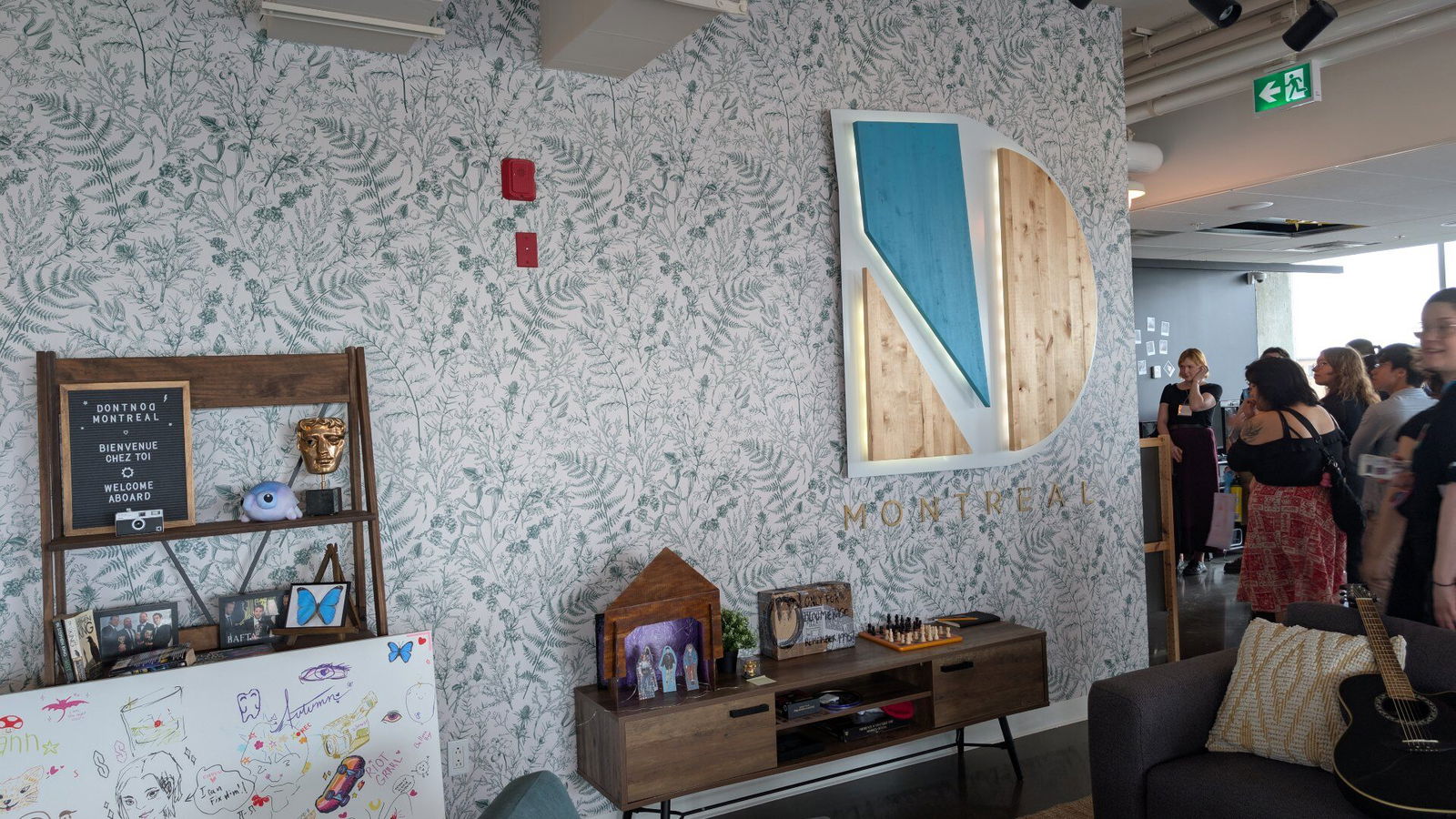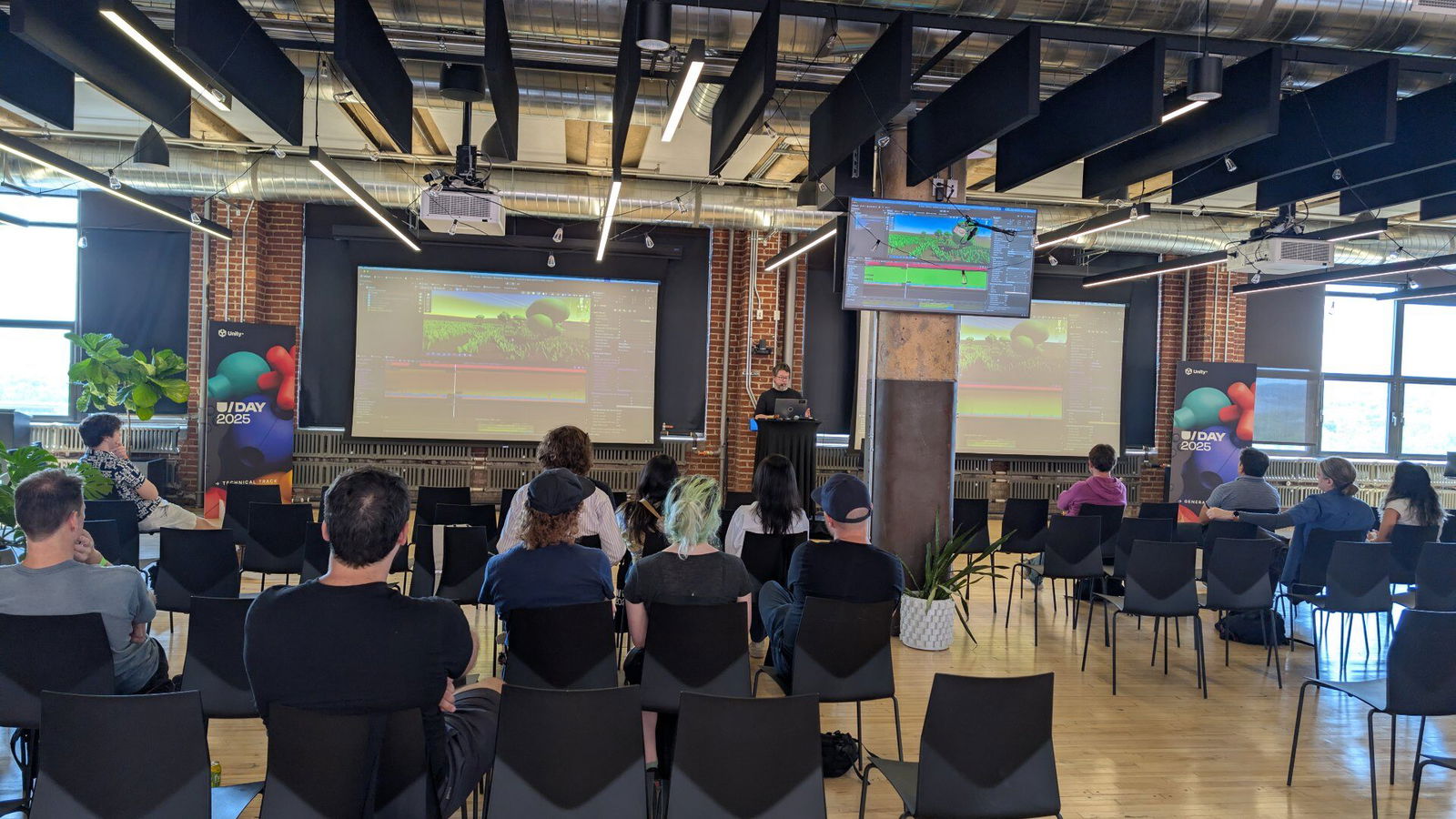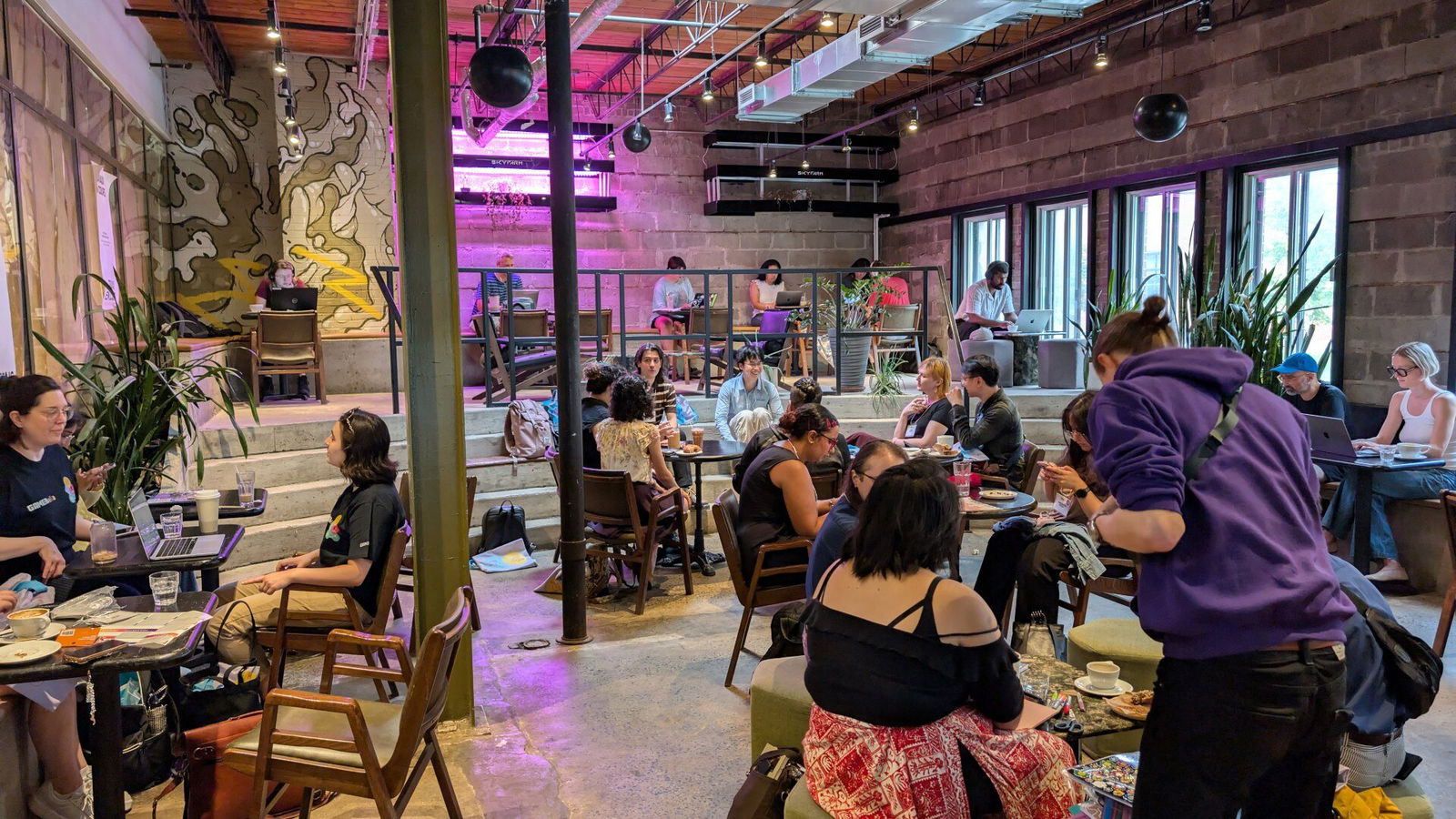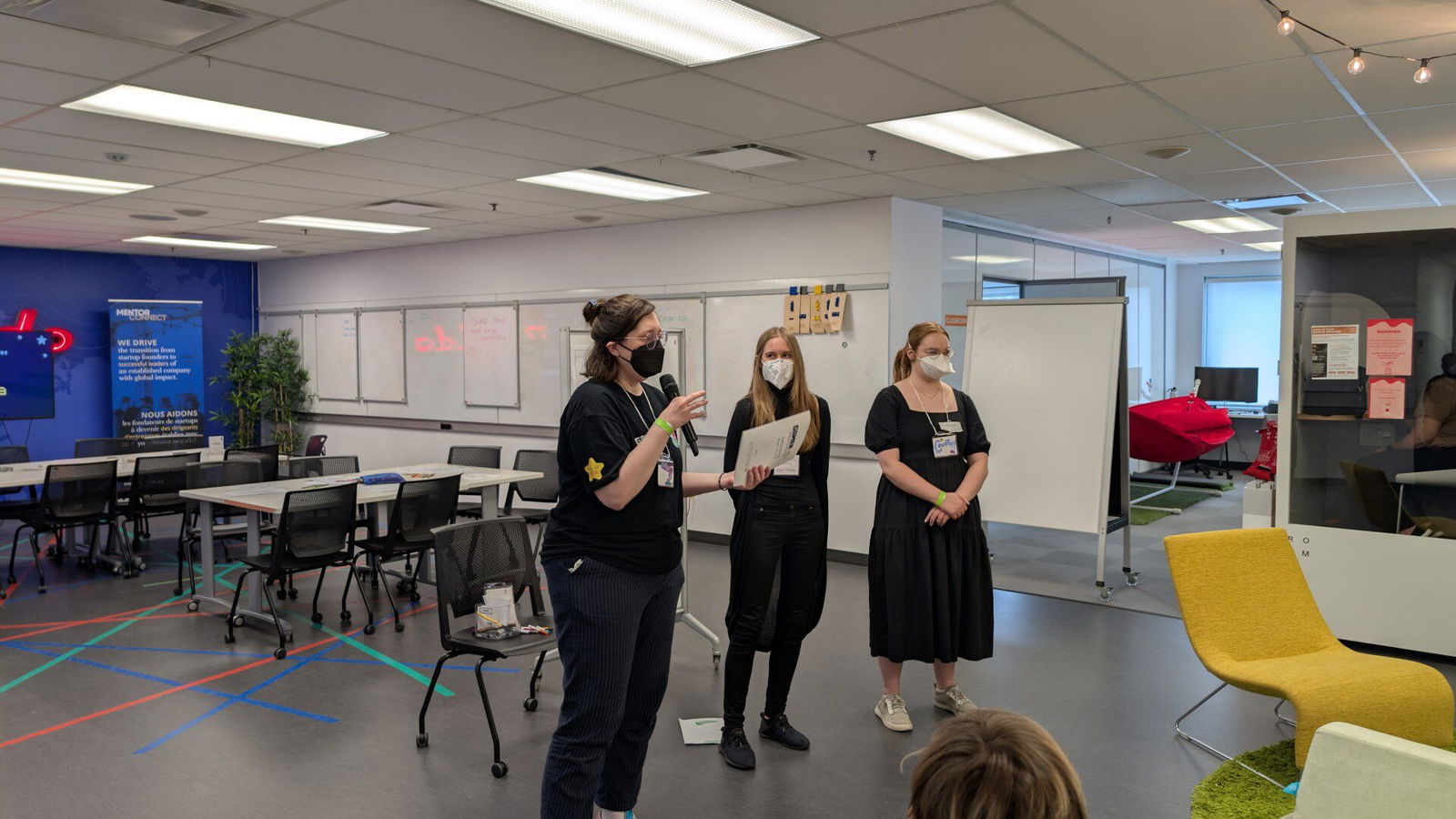If you have not heard of GAMERella, a Canadian non-profit organization, their stories, work, dedication, and experience will leave you wanting to know more about them—especially if you are an aspiring game developer! CGMagazine had the amazing opportunity to join GAMERella’s first-ever Mentorship Initiative two-day retreat in Montréal, Canada. GAMERella is paving the way to mentor young artists and devs in the video game industry in the most ethical manner, while spotlighting underrepresented creators/devs. These next-gen game designers/devs could create the next international hit game, like how Alberta native Maddy Thorson brought TowerFall and Celeste to life.
The GAMERella Mentorship Initiative caters to helping develop participants’ professional skills, boost their portfolio, and participate in networking opportunities so that they can enter the industry with knowledge and confidence. As part of the Canada Media Fund (CMF) Changing Narratives and Sector Development Support Funds, GAMERella continues promoting the phenomenal talent that deserves space to thrive in the games industry. I can attest that this non-profit organization is doing its darnest for its mentees/participants.
For some background knowledge, Gina Hara and Charlotte Fisher founded GAMERella back in 2013. Both entry-level video game industry leaders at the time felt the need for creating welcoming and diverse game spaces in Montréal—particularly for women, queer, and neurodivergent developers.
“I heard about Global Game Jam, and that always intimidated me because I always pictured a bunch of white dudes sitting in a room with the lights off and neon lights,” Fisher explained about her initial hesitation to check out more game jams. This was before her time at Concordia University. “The first [game jam] I went to was at Concordia. [Concordia] allowed me to get over that hump of feeling inadequate, not being gamer enough, or just being a woman in that space.”

Sadly, both Hara and Fisher’s experiences of finding inclusive, supportive game jams did not really exist. “I decided to go to Global Game Jam, but I didn’t feel welcomed. I was very shy, self-conscious, and everyone already seemed like a pro,” Hara detailed about their initial time going to game jams. “I was talking to some of my other friends, and it turned out I was not the only one. So, Charlotte Fisher and I shared this same experience. We decided, ‘Why don’t we make a game jam that is friendly, where you don’t have to stay awake overnight, and isn’t competitive?’ And so we made GAMERella.”
While the two gaming powerhouse leaders diverged paths over the years since their work at Concordia and GAMERella, Hara and Fisher continued to run the game jam and now mentorship organization for 12+ years. Hara held down the fort on the frontlines while Fisher went on to work at Unity, but was still overseeing operations and opening up opportunities for GAMERella mentees/participants.
Then, now-co-director Courtney Blamey joined GAMERella 5 years ago. Her experience, dedication, and studies at Concordia aligned with the non-profit’s mission and goals, as Blamey’s game design background was instrumental to levelling up the organization. Blamey focuses on meaning-making in games that involve emotional design and explores the relationship between player and designer in her critical game design process.
Unfortunately, the gaming ecosystem and culture continue to be filled with hate and harassment. Hara pointed out in our brief online discussion about how the biggest issue across many game studios is “crunch culture.” She noted how “people are being overworked, especially before deadlines.” The other major issue Hara noted was how “queer, trans, and two-spirited individuals are constantly not welcomed in the gaming industry.”

When asked about how Fisher’s experience and knowledge at GAMERella helped with her new role at Unity, she noted how “the events [work] is still transferable.” She mentioned how her work still involves “getting the right people in the rooms, making sure that it’s an inclusive space, and giving people the time and space to be together and have community.”
Fisher never strayed from her gaming and community roots, maintaining her sense of advocacy—such as recruiting new Unity team members from different backgrounds and perspectives. “Someone who went to her first game jam [at GAMERella] works on my team, and she tells me all the time. She says, ‘I go every year. It’s my favourite jam.'” Fisher left off by stating how she is always “scouting” for new mentors and mentees at Unity to help out with GAMERella.
CGMagazine took part in GAMERella’s first of two retreats for the Mentorship Initiative, led by co-founder Gina Hara and her wonderful team. The mentees all met for the first time in-person at the local coffee shop, Café Saint-Henri, where plenty of friendly conversations. Venturing through the rainy Montréal was something out of Death Stranding, but thankfully, no BTs were present and we all travelled in a big group—like one happy family!
The first stop was the DON’T NOD Montréal studio, where Lost Records: Bloom & Rage was fully produced. Multiple team members also worked on the Life Is Strange franchise, who came over from the Paris branch. The mentors and mentees recieved a studio tour, along with a Q&A panel, featuring Studio Executive Director, Luc Baghadoust; Lead Character Artist, Juliette Devillers; Studio Creative Director, Michel Koch; and Senior Brand Manager, Marin Yvon-Maze.
The second stop for the first day was at the Unity Technologies studio. Everyone at GAMERella explored and sat in on fireside chats, learning about how game devs can optimize their games through the Unity game engine. This was a great opportunity for programmers and the like to learn new skills and ask the professionals some of their burning questions. After extensive time at Unity, the mentorship party wound down at the GAMERella x Pixels & Poutine networking event, where the mentors and mentees had a great time to chat with one another.
The last day contained two vital workshops for the GAMERella mentees, taking place at Concordia University. Both workshops were led by major video game industry leaders Osama Dorias and Logan Lesage, who respectively worked at big studios such as WB Games, Blizzard, and Ubisoft. These two workshops outlined how aspiring game devs/designers can best optimize their CVs and portfolios to get their foot in the door at game studios. Like any occupational sector, getting the initial interview is one of the toughest parts!
Dorias designed a special workshop for the mentees on creating the best CVs, by using some of the pre-submitted ones (turning them anonymous) from the mentees. He taught them how to tailor a CV to the specific needs of the game development industry, reducing friction and increasing the chances of getting noticed by recruiters.
“[Game industry] recruiters usually come from disciplines of game design, game development, or [nothing within the game industry]. They’re good at their job, but they’re not always skilled at the thing they’re hiring for. And it’s unreasonable to ask them to be because there’s so many [different roles] they’re hiring for…What I go through is trying to explain the [hiring] habits. [Letting people know] who are the gatekeepers, what the resume process is, and how to remove friction so applicants can get further in the hiring process.”
GAMERella has the secret sauce to raise the next generation of Canadian game devs, and they are doing it the right way. Talking with some of the mentees, each individual has different goals within the video game industry and the GAMERella Mentorship Initiative. One of the mentees, Sarah Raine, was very thankful for her first studio visit to DON’T NOD.
“The visit to DON’T NOD was enlightening because I have not been to a game studio. I feel like other schools have programs where you get to do studio visits. That was missing from my educational experience. Getting to see the environment I would be working in and seeing the people that I could be making games with, it got me really excited for what I want to do as a career.”

Mentee Inès Bouakkaoui is a senior student in Integration Multimedia at Collège Bois-de-Boulogne, with a background in Chemistry and a passion for science, technology and art. She has a unique background which blends a wide array of science, tech, and art with video games. But like her fellow mentorship peers, she hopes to “build [her] portfolio” the right way, with GAMERella’s help.
Another mentee, Alissia Bocarro, shared how they appreciated visiting DON’T NOD to see “what’s ahead in the industry,” and how she never had the opportunity in school to check out a game studio before. Bocarro and every other mentee have one thing in common: they all appreciate meeting their peers and mentors in-person and networking. Mentee Darius Fang joined GAMERella’s Mentorship Initiative for its big networking opportunities. He also expressed interest in joining GAMERella’s next game jam, “That’s something I’ve never done because I heard about the mentorship first. Now, I’m curious how that experience works.”
Speaking with mentor and senior game designer at Behaviour Interactive, Nicolas Barriere-Kucharski and mentee Justin Roberts, they both expressed hope for personal and professional growth through the GAMERella Mentorship Initiative. Roberts has a Master’s in media studies at Concordia, and had a significant interest in queer game studies.
“I’ve done GAMERella game jams before, so my hope [with the Mentorship Initiative] is to take full advantage of meeting all the incredible people and talent that’s here. Also, [I want to] build a community and more confidence…I haven’t been in a space that I thought about CVs and what my portfolio should look like. For a lot of people in my position, a program like this is helpful with providing that sense of direction and confidence-building as well,” Roberts described.

Continuing on the topic of building confidence and representation, Barriere-Kucharski shared his experiences and how it was still difficult back in his day. “The transition from my schooling into full-time development really took me a while….15 years later and I’m still like, ‘oh, wow. That was painful and stressful to figure out what I need to do,'” Barriere-Kucharski stated with all honesty.
“Figuring out what your dream is and how to achieve it, it’s a million little steps and efforts until you can find a modicum of stability…And so, I’m really interested in giving back. I’m happy to help [make it easier for the next generation], and pay it forward because we need more diverse people in games. There’s not enough of us.”
Ultimately, GAMERella’s first Mentorship Initiative appears to be thriving. Hara, her awesome team, and mentors/peers all showed how much they are willing to go above and beyond to prepare every future game dev/designer for a better experience in the video games industry than they experienced themselves. Here is a list of GAMERella’s first Mentorship Initiative mentees, containing names who could potentially be making the next big game you are playing in the near future:
- Allie Bocarro
- Hitesh Kumar Sharma
- Kien Ho
- Laura Bascopé Butron
- Sarah Raine
- Maëlig Beaupérin
- Des Cendres Rivière
- Darius Fang
- Nana Valentina
- Kira Fountain
- Justin Roberts
- Nicholai A. Melamed
- Tuana Bıçakcı
- Inès Bouakkaoui
- Briar Lee Molto
Huge thanks again to co-founder, Gina Hara, and Route 504 PR, who helped connect and capture the essence of GAMERella’s significant historical roots, right up to the meaningful work they are doing now. Be sure to check out the official website and socials to stay updated on their upcoming game jam! GAMERella invites women (cis/trans), trans men, non-binary/genderqueer folks, 2SLGBTQIA+, BIPOC, and any others who feel they have not had a chance to make a game, to join them in a weekend of fun game-making November 15-16, 2025. Signups open in September 2025.
Updated August 13th, 2025, at 2:15pm




